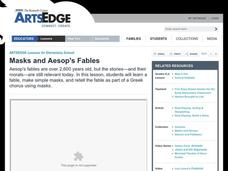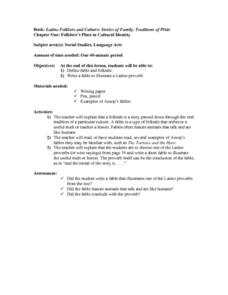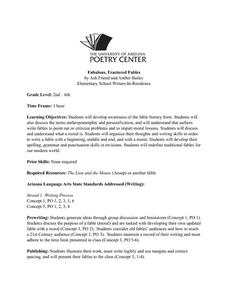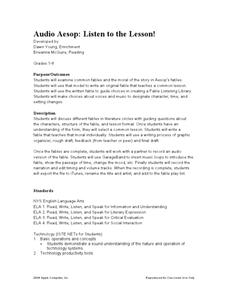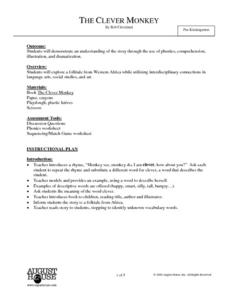Curated OER
Masks and Aesop's Fables
Students study and perform Aesop's fables. In this Aesop's fables lesson, students read and/or listen to a number of the famous fables. They make masks based on the characters and perform a fable using the masks. They write about the...
K5 Learning
The Wolf
Fourth graders have likely heard the expression to cry wolf, but they may not know the saying's origin. A short reading passage tells the story and includes four comprehension questions for pupils to demonstrate their...
Nosapo
Reading Activity: Circle the Right
Fables can teach us about life's morals, but they are also helpful for reviewing verb tense, spelling, and word choice. Three reading passages feature well-known fables, each with several opportunities for students to circle the correct...
Lied Center of Kansas
The Ugly Duckling and The Tortoise and the Hare
Both The Ugly Duckling and The Tortoise and the Hare are great additions to an elementary language arts lesson. Young readers focus on the literary elements of each story, including characters and plot development, and apply...
Curated OER
Theme and Fables Review
In this fables worksheet, students read fables and write the moral of the story and how their answer relates to the story. Students do this for 5 stories.
Curated OER
And the Moral of the Story is...
Students retell a story using computer software. In this story elements lesson, students retell the story giving the plot, setting, characters and moral using Pixie software.
Curated OER
Latino Folklore and Culture: Stories of Family, Traditions of Pride
Students define the terms fable and folktale. They write a fable to illustrate a Latino proverb. Students are explained that a folktale is a story passed down through the oral tradition of a particular culture. A fable is a type of...
Curated OER
Fabulous, Fractured Fables
Elementary schoolers develop an awareness of the literary form known as the fable. They explore how authors write fables to pass along moral lessons. After reading and discussing many famous fables embedded in the plan, learners attempt...
Curated OER
Audio Aesop: Listen to the Lesson!
Aesop's Fables are the focus of this language arts instructional activity. Young philosophers study and discuss the morals found in the most famous of Aesop's Fables. They write an original fable that teaches a common moral. A "Fable...
Curated OER
Fables Unit Lesson Plan
Students study fables in a broad context. In this literary lesson on fables, students define terms unique to them. Students use a variety of technological resources to gather and classify information into three categories. Students also...
Curated OER
Acting Like a Bunch of Animals: Fables and Human
The video "The Tales of Aesop" traces for viewers the history of fables and identifies their characteristics. The class then goes to the web site "The Fisherman and the Little Fish" where they examine the classic and a modern version of...
Curated OER
Fables and Trickster Tales Around the World
Students analyze fables and trickster tales from various cultural traditions. In this fable analysis lesson plan, students identify the elements of fables and trickster stories. Students read Aesop's fables and Ananse spider...
Curated OER
Fable Writing--Inter-disciplinary Approach To Social Sciences
Students recognize the elements of a fable and write an original fable. They make connections with morals and other law-related concepts.
August House
The Contest Between the Sun and the Wind
Learn the moral of the story with a series of activities about Aesop's fables. Focusing on The Contest Between the Sun and the Wind, learners complete a graphic organizer to discuss who, what, how, and why the events occur. Additionally,...
English Worksheets Land
The Donkey, the Fox and the Lion
Have learners read about a lion that lures a foolish fox into a trap and gets himself and his donkey friend eaten. After reading, pupils answer three questions and determine what the lesson of the story is.
Virginia Repertory Theatre
The Town Mouse and the Country Mouse
Accompany the story, Town Mouse Country Mouse by Jan Brett with an assortment of activities designed to reinforce concepts covering story structure, comprehension, grammar, and social studies. Here, scholars identify the difference...
August House
The Clever Monkey
Your clever kindergartners will enjoy a series of activities based on the West African folktale, The Clever Monkey, adapted by Rob Cleveland. They sequence the story with pictures, copy sentences, illustrate idioms about cats,...
Curated OER
Greek culture and Aesop's Fables
Tenth graders explain political and social thought during the Greek 6th and 5th centuries B.C. They research five to eight fables, figuring out the moral for each and writing an essay on how Aesop influenced the morals and ideals of...
Curated OER
Writing a Fable
Students are introduced to the definition of a fable in that it is a story that has a moral for people to apply in their lives. They then read a fable together so they have a better understanding. Next, students write their own fables.
Curated OER
Fable Writing
Students listen to and discuss various fables, and identify the moral and central themes. They write their own personal fables and create illustrations to go with them.
Curated OER
Understanding and Writing Fables
Third graders review with the teacher the characteristics for a fable and what it is. They read one paragraph each from the story, "The Fox and the Stork" aloud. They then answer comprehension questions aloud. Next, they listen to four...
Curated OER
Elements of the Oral Tradition
Various genres of oral tradition are outlined and defined in these slides. Give your class examples of folk tales, fairy tales, parables, fables, legends, and myths before reading an example of one of these stories. This overview acts as...
Curated OER
Lots of Lessons from Aesop
Aesop’s Fables offer young learners an opportunity to study figurative language. After reviewing theme, simile, alliteration, and metaphor, model for your pupils how to identify examples of these devices in the fable. Class members then...
Curated OER
Snail Mail vs. E-mail: Let the Challenge Begin
Compare past and present forms of written communication with a fable to guide your pupils in discovering the benefits of various forms of written communication.


